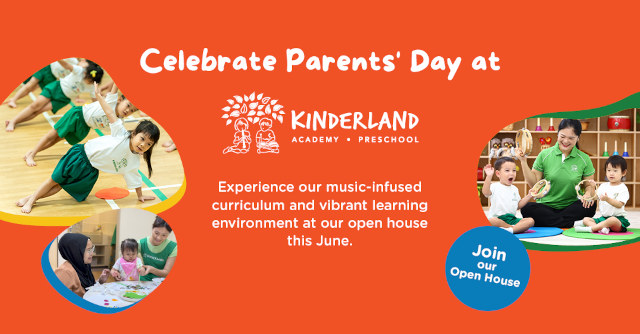Struggling to teach your child? Ms Charlotte Wong, Senior Manager with Kinderland Educare Services shares how teaching your child can be enjoyable and rewarding with these SMART tips.

Types of Learning Styles
Learning styles differ from one child to another. They can be broadly categorized as visual, auditory or kinesthetic learners. By knowing your child’s learning style and understanding what helps them learn, you will be one step closer to teaching successfully.
Visual learners learn best when they can see the knowledge presented in a pictorial form or when words are spelt out. Parents can write, draw and show pictures while explaining information so that their child can understand better.
Auditory learners benefit from listening to what is taught, as well as speaking and discussing. These learners will require a quiet learning space where there is little noise to distract them.
Kinesthetic learners enjoy using their bodies to learn through acting out, role-play and physical activities. Some may need to have 3-D models and physical objects to facilitate learning.
However, young children’s learning abilities are agile and malleable. Parents may help by providing a variety of teaching techniques in order for them to adapt easily to a combination of how information is delivered. Research shows that children who are versatile in their learning styles tend to be more effective learners.
Meaningful Learning
Learning is effective when the child finds it meaningful and can apply or transcend the knowledge into other contexts. Parents are also the best teachers when they identify incidental learning moments.
While drinking soup during dinner, parents may teach comparative and superlative adjectives of whose soup is warm, warmer and warmest. Children will remember the concept better if the learning is experienced and makes meaning to them.
What about the application? Can we compare the height of the family members? Size of toys? Can we explore comparative adjectives with irregular forms? For example, if Daddy has a little on his plate, Mummy has less and baby brother has the least to eat.
Ask Questions

Research has shown that children learn best when there is an adult who provides guidance and leadership in the learning process. A crucial criteria to check if learning is achieved is to get a response from the child.
When reading the storybook “Goldilocks and the three bears”, parents may ask children what happened to the chairs when Goldilocks sat on them at the bears’ house, to confirm understanding of the story.
Ask the older children what-if questions to stretch their analysis and reasoning skills. Try asking, “If the three bears were home when Goldilocks came into the house, how would the story be different?”
Refreshing techniques and learning environments

Parents may provide unique and interesting learning techniques and environments for their children to help them learn better. A change of format or surroundings removes the predictability and boredom.
For example, use watercolour painting with familiar rhymes for younger children to learn new vocabulary. Try using a timer and game formats to see who can remember related words faster.
Use baking or cooking to learn how to read recipes, measure ingredients to learn mathematical concepts and comprehend the science of heat and expansion while the food is being cooked.
Learning does not have to be confined to the house, go outdoors to learn spelling by writing in sand with a stick or use leaves and pebbles to form alphabets. Count the steps taken to walk around the playground or measure its length with balls of different sizes. The possibilities are infinite with a little creativity.
Take Time

Understand the most suitable time for children to learn. Usually, it is when they are well-rested and their basic needs met. Research shows that the quality of learning is directly correlated to children’s alertness and interest level.
Parents should also teach only when both parties are physically, mentally and emotionally ready so that the time spent together is fruitful.
Identify a fixed time and place in the day for structured learning to help children get into a routine. This should be a pleasant experience and once the child enjoys learning, half the battle is won.
By Ms Charlotte Wong, Senior Manager with Kinderland Educare Services.
Celebrate Parents’ Day at Kinderland
📢 Come and celebrate Parents’ Day at Kinderland Academy & Preschool’s open house this June 📢
Experience Kinderland’s music-infused curriculum and vibrant learning environment at our open house this June. Enjoy an exclusive enrolment promotion if your child starts class by 1 July 2024!
This article was first published in The New Age Parents e-magazine.
* * * * *
Like what you see here? Get parenting tips and stories straight to your inbox! Join our mailing list here.
Running a service or business targeted for parents? Reach out to a wider audience in our Preschool Singapore compilation. Leave your contact details here and we will get in touch with you.



























































Leave a Comment: